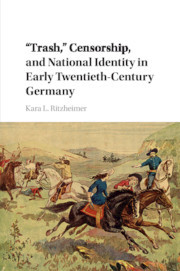'Trash,' Censorship, and National Identity in Early Twentieth-Century Germany
Auteur : Ritzheimer Kara L.

Date de parution : 02-2019
Ouvrage de 328 p.
15.1x22.8 cm
Disponible chez l'éditeur (délai d'approvisionnement : 14 jours).
Prix indicatif 30,28 €
Ajouter au panierDate de parution : 06-2016
Ouvrage de 326 p.
16x23.6 cm
Disponible chez l'éditeur (délai d'approvisionnement : 14 jours).
Prix indicatif 104,06 €
Ajouter au panier